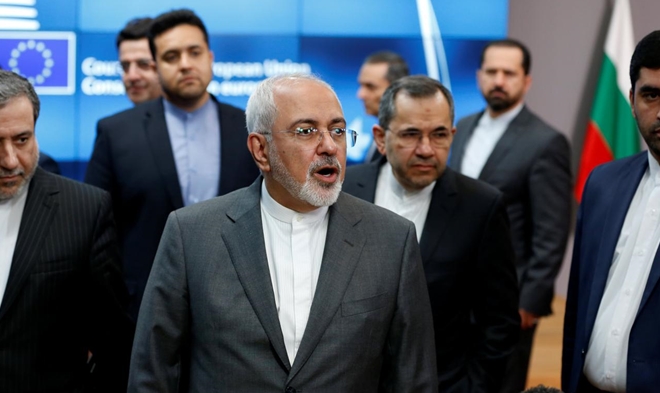With few options, Iran, Europe try to save nuclear deal
- Europeans work to save Iran deal, and business, after Trump pulls out
- Europe signals patience drying up as US re-imposes harmful Iran sanctions
- Israel says it attacked targets in Syria after Iranian rocket fire
Iran’s Foreign Minister Mohammad Javad Zarif arrived in Brussels ahead of a meeting with his British, French and German counterparts later on Tuesday, holding “good and constructive” talks with EU foreign policy chief Federica Mogherini.
 |
| With few options, Iran, Europe try to save nuclear deal |
“We are on the right path to move forward ... Whatever (is) decided should preserve and guarantee Iran’s rights ... Our talks (with the E3) will continue in the next two weeks,” he said, referring to Britain, France and Germany.
Many European diplomats doubt privately that the 2015 accord between Iran and six world powers can survive the reimposition of U.S. sanctions ordered by Trump, but the European powers will say that they stick by the terms of the 2015 pact giving Iran sanctions relief in return for an end to its nuclear ambitions.
Iranian President Hassan Rouhani asked the European Union to stand against the United States’ “illegal and illogical” actions, saying that Tehran could stay in the accord only if it fully benefits from it.
The accord lifted international sanctions on Iran in 2016 in return for Tehran shutting down its capacity, under strict surveillance by the U.N. nuclear watchdog, to stockpile enriched uranium for a possible atomic bomb.
Trump denounced the accord, completed under his predecessor Barack Obama, as a “horrible, one-sided deal that should have never, ever been made” as it did not cover Iran’s ballistic missile program or its role in Middle East conflicts.
The deal’s proponents say it is crucial to forestalling a nuclear Iran and preventing wider war in the Middle East.
Mogherini, who as the EU’s top diplomat chaired the final stretch of 12 years of negotiations to clinch the Iran accord in July 2015 in Vienna, said: “We will all save it together.”
Zarif said talks would go on for the next two weeks and EU diplomats said they needed some time to understand the U.S. position.
“One of the questions that we need to ask the Americans is whether their final objective is to make the Iranians yield on its nuclear program or to get rid of the regime,” said a senior French official, acknowledging that Paris was concerned by the ideological shift in Washington since John Bolton was appointed U.S. National Security Advisor.
Those comments were echoed by Foreign Secretary Boris Johnson who told parliament that regime change in Iran was not a policy Britain should pursue.
French diplomats said they also wanted to assess Iran’s intentions in sticking to the deal, but also to see how open it was to serious talks on other Western concerns.
French President Emmanuel Macron has said he wants to secure a wider deal after the U.S. withdrawal with four pillars: limiting Iran’s nuclear program in the short and the long term, restraining its ballistic missile program and curbing what the West views as its destabilizing behavior in Syria, Yemen, Iraq and Lebanon.

